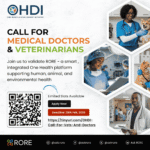The Cornell Wildlife Health Center strives to sustain a healthier world by developing and implementing proactive, science-based solutions to challenges at the interface of wildlife health, domestic animal health, human health and livelihoods, and the environment that supports us all. With an emphasis on the types of interdisciplinary collaboration often required to foster real progress along with the science to policy and action continuum, we work with a diverse range of stakeholders including governments, local communities, non-governmental organizations, and students in the U.S. and around the world to promote environmental stewardship, build capacity for sustainable change through training and education, and undertake collaborative research and discovery that leads to real-world conservation and related health outcomes. Humanity has brought changes to Earth’s natural systems at a pace and scale that are difficult to overstate – our domination of land and sea has no precedent. If we are to successfully address the challenges of saving wildlife on an increasingly human-dominated planet, with species extinctions now one thousand times faster than before our rise, we must recognize that our own health, and that of the global economy, are inextricably linked to our stewardship of the natural world. The COVID-19 pandemic has underscored this for all of humanity.
The Cornell Atkinson Center for Sustainability is the hub of collaborative sustainability research at Cornell University, forging vital connections among researchers, students, staff, and external partners. The center’s funding and programming accelerate groundbreaking research within and across all of Cornell’s colleges and schools. In turn, the center is one of the university’s key catalysts for bold ideas and powerful new models that ensure people and the planet not only survive but thrive, with an emphasis on policy-relevant science, the uptake of which depends upon genuine stakeholder engagement.
Our February 2021 webinar, “Emerging Disease, Wildlife Trade and Consumption: The Need for Robust Global Governance— Exploring Ways to Prevent Future Pandemics,” generated significant public interest on this important One Health challenge and the holistic framing that we see as key. One thing remains very clear: it is currently “no one’s job” to try to comprehensively manage the global public health risks associated with the set of upstream human behaviors that intensify our interactions with wildlife and the zoonotic pathogens potentially harbored— not WHO, OIE, FAO, or UNEP, not CITES or IPBES or CBD or INTERPOL, nor the G7 / G20. This new One Health Fellowship position is based on our belief that this glaring gap in global governance and accountability simply must be addressed.
We thus seek a Fellow with specific strengths in international policy and legal analysis, along with an earnest belief in the power of partnerships. As part of a collaboration between the Cornell Wildlife Health Center, Cornell Atkinson and a growing external advisory group of key partners and experts, the new Fellow will assist our team to:
- Review the significant range of currently identified policy options, as well as propose new ones, for mitigating the upstream risks tied to those human behaviors that intensify our interactions with wildlife and the zoonotic pathogens potentially harbored, including but not limited to options for expanding existing international agreements and/or developing new ones, as well as capturing relevant lessons learned from international agreements focused on other sectors (e.g., nuclear non-proliferation, substances that deplete the ozone layer, etc.). This scope of work does not include risk mitigation as related to laboratory biosecurity or bioterrorism— important, of course, but beyond our purview.
- Generate policy briefs and peer reviewed papers and that can be used with decision-makers and non-academic partners domestically and internationally.
- Work with public and private sector stakeholders to further inform and support the building of partnerships and coalitions to advance effective policy action to truly prevent pandemics as far upstream as possible (which is a different emphasis than that of the many important endeavors currently focused on addressing public health emergencies once they have already been sparked).
The position location is, ideally, Ithaca, NY, but the opportunity to work remotely will be reviewed, noting Cornell’s approved US domestic locations that meet all liability and compensation policies. The fellowship is envisioned as being for two years, with the second-year contingent upon satisfactory performance in year one, and ongoing availability of funding. Salary commensurate with qualifications and experience.
REQUIREMENTS:
We are searching for a highly motivated and skilled subject matter expert who has:
- An advanced degree related to international policy/law (e.g., JD or equivalent, Ph.D.). Candidates with highly relevant experience whose highest academic degree is at the MA / MBA / MPA level will be considered, and experience in the environmental sector is a significant plus.
- Experience with one or more relevant international treaties/agreements
- Experience with one or more relevant major multilateral institutions
- Excellent communication skills, both in terms of professional writing, writing for non-expert audiences, and public speaking
- Excellent interpersonal skills, and an affinity for working as part of a multidisciplinary team
- Strong collaboration skills/ability to work with a diverse range of partners and stakeholders
- Proven organizational skills and the ability to work independently while adhering to tight timelines
- A genuine interest in creative thinking and problem-solving at a critical juncture in history for humanity.
The application deadline is July 1, 2021





